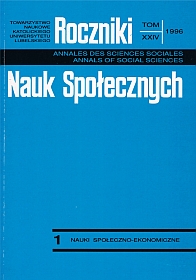Pluralizm, Kościół i państwo w filozofii społeczno-politycznej Jacquesa Maritaina
Abstrakt
The paper seeks to analyze the theoretical solutions connected with the question of pluralism in matters of ideas and faith and the place of the Catholic Church in a democratic state. This pluralism is an essential element of contemporary democracy. On the other hand, it is indispensable to reach consensus as to the basic principles of axiological order of democracy, such as freedom, equality, brotherly love, dignity of the human person, human rights etc. When people recognize those ideas together (which is made possible when they lack uniform theoretical justifications) Maritain calls it a "lay belief." Meanwhile his aim was to base the axiological order of democracy on the theoretical foundations of the Christian philosophy of personalism. This is linked with the dominance of Christian philosophy in the realm of ideas, which is to support the Christian vision of social life. The author has presented some difficulties concerning such a solution.
The question of pluralism in matters of ideas and faith is connected with the relationship: the Church-the State. Maritain has put forward a new model of relations between the Catholic Church and the state, a model which corresponds to our contemporary age. His model recognizes distinctness and autonomy of both subjects in their respective provinces. The paper analyzes the general assumptions of the cooperation between the two subjects and shows the theoretical foundations of the relation: the Church-the state in J. Maritain's view.
Copyright (c) 1996 Roczniki Nauk Społecznych

Utwór dostępny jest na licencji Creative Commons Uznanie autorstwa – Użycie niekomercyjne – Bez utworów zależnych 4.0 Międzynarodowe.


